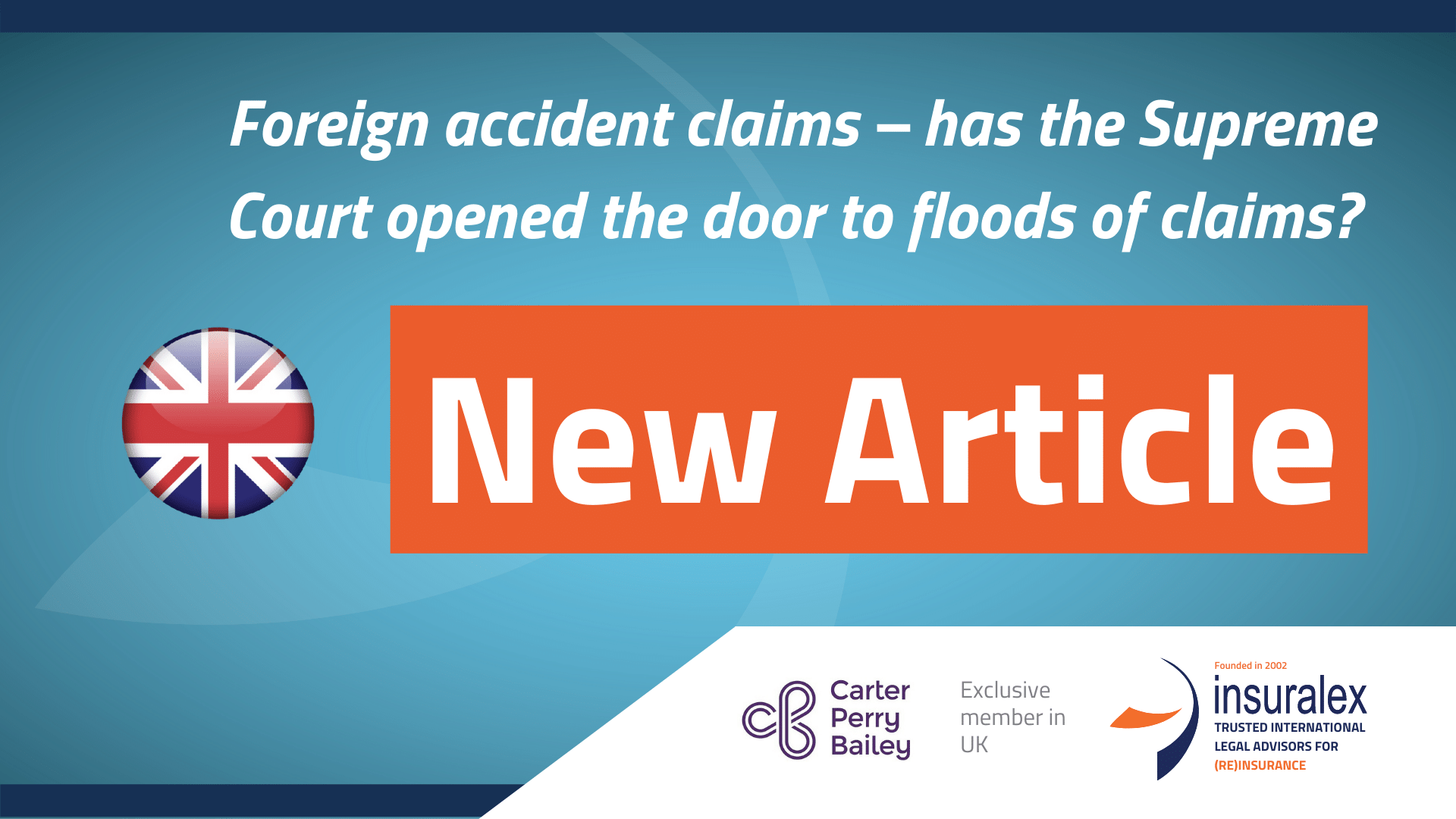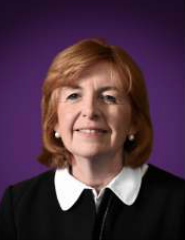
Foreign accident claims – has the Supreme Court opened the door to floods of claims?
The Supreme Court handed down judgment in FS Cairo (Nile Plaza) LLC v Brownlie [2021] UKSC 45, clarifying the Courts are now more likely to accept claims from English and Welsh litigants over wrongdoings that have taken place abroad provided those litigants can show some degree of damage has occurred in England and Wales and that the English Courts are the appropriate place for the claim to be heard.
Background
The facts of the claim are simple, and sadly not unusual in cross-border claims. While on holiday in Egypt, the Claimant, Lady Brownlie, and her late husband took part in a safari booked via their hotel.
The tour ended in tragedy. The chauffeur-driven vehicle became involved in an accident in which Sir Ian Brownlie QC and his daughter were killed. Lady Brownlie and her two grandchildren suffered severe personal injuries.
Lady Brownlie commenced proceedings on 19 December 2012 against Four Seasons Holdings Incorporated (“FSHI”), a company incorporated in Canada. As a result, Lady Brownlie could not use
the jurisdictional rules within the Brussels Regulation applicable at the time. Instead, for the first time in the matter, Lady Brownlie sought to establish her claim satisfied the common law
jurisdictional gateways. To obtain permission to serve her Claim Form out of the jurisdiction, she had to satisfy the criteria set out within Practice Direction B to Part 6 of the Civil Procedure Rules.
She brought claims against FSHI in both contract and tort, and sought permission to serve out of the jurisdiction on two limbs:
– The excursion was booked, over the telephone, whilst the family were in the UK and therefore she argued the contract for the excursion was concluded within the jurisdiction, thus satisfying
the gateway at paragraph 3.1(6)(a); and
– The harm suffered consequent upon the alleged tort was harm suffered within the jurisdiction, thus satisfying the gateway at paragraph 3.1(9)(a).
Whether or not the claim could proceed was the subject of multiple appeals and cross-appeals. The matter came before the Supreme Court in 2017. However, the issue as to whether Lady Brownlie
had satisfied the gateway test (either in contract or tort) was not determined as FSHI was found to be a non-trading holding company which had no operational control of the hotel. However, given
the manner in which FSHI had failed to disclose that information, the Court gave Lady Brownlie permission to amend her pleadings, and the case was remitted back to the High Court.
In October 2019, the Court granted permission to substitute FS Cairo and gave permission for Lady Brownlie to serve proceedings upon it out of the jurisdiction (where it was domiciled in Egypt). The High Court also determined that, picking up on the earlier gateway arguments, the English Courts did have jurisdiction to hear Lady Brownlie’s claims in both contract and tort. The Court, however, also granted FS Cairo permission to appeal on the scope of the tort gateway, and on the question of whether there was a reasonable issue to be tried. The Court of Appeal upheld the lower Court’s decision, leading to FS Cairo appealing to the Supreme Court.
For permission to be given to serve a Claim Form out of the jurisdiction, Lady Brownlie had to establish:
(1) The claim fell within one of the ‘jurisdictional gateways’ contained within Paragraph 3.1 of the Practice Direction 6B to the Civil Procedure Rules;
(2) The claim had a reasonable prospect of success;
(3) The Courts of England and Wales were the appropriate place to hear the claim
The Tort Gateway Test
Where a claim is based on tort, the Claimant must also satisfy the requirements of CPR PD6B paragraph 3.1(9). This provides that the Claimant may only be permitted to serve out of the
jurisdiction where either:
– “damage was sustained, or will be sustained, within the jurisdiction”, or
– “damage which has been or will be sustained results from an act committed, or likely to be committed, within the jurisdiction”.
The issue before the Supreme Court was, then, the scope of the interpretation of the word ‘damage’ in paragraph 3.1(9).
It was clear that the accident had taken place in Egypt and that personal injury was sustained immediately. FS Cairo argued that the ‘damage’ contemplated by Paragraph 3.1 was akin to that
necessary to found a cause of action in tort and that such had to be direct, in the sense of immediate, not some indirect / later in time incidence. Lady Brownlie submitted that the ‘damage’
she sustained continued long after the accident itself as she continued to suffer pain and suffering on a daily basis, to include when having returned to England.
Lord Lloyd-Jones was not persuaded by FS Cairo’s approach. Amongst others, he pointed out the gateway applies to all torts including trespass, which is actionable without proof of damage.
Further, he held neither the wording nor the legislative history of the provision justified a restrictive interpretation; on the contrary, the ordinary meaning of the word ‘damage’ encompasses significant and continuing damage.
Addressing concerns that this might lead to a flood of claims, Lord Lloyd-Jones pointed out that passing through the tort gateway is only the first step of the test. Any Claimant must also
demonstrate that England and Wales is in all circumstances the proper place in which to bring its claim. He also noted that the Civil Procedure Rules provide a ‘safety valve’, since the imposition of
the forum non conveniens test requires a Claimant to show that England is the proper forum in which to bring the claim. If the link to England is only casual, permission to serve out of jurisdiction
would not be granted.
The foreign law issue: presumption of similarity
The second issue for the Court to decide, having regard to the terms of CPR 6.37(1)(b), was if Lady Brownlie had demonstrated that her claim had reasonable prospects of success. It was agreed
between the parties that Egyptian Law applied to the claims.
FS Cairo argued that Lady Brownlie had merely pleaded that she was entitled to “damages pursuant to Egyptian Law”, but had not relied upon any specific rule or provision to support that claim –such that she had not satisfied the test imposed upon her. In response, Lady Brownlie argued that, absent evidence from either party as to the application of Egyptian Law, the Court should apply
English Law.
The Court (per Lord Leggatt who gave the Judgment with which the other four Judges concurred) set out the nature of its power where two conflicting principles existed – being the “default rule” and the “presumption of similarity”. The former provides that English Law applies to a dispute where no foreign law is pleaded even if, as here, it was clear that a foreign law ought to apply. By contrast, the presumption of similarity arises where a foreign law is not pleaded, but the Court is willing to conclude that English Law principles are similar to the law that would otherwise apply. The presumption of similarity is more likely to apply where the equivalent law is from a common law jurisdiction, rather than being based on Roman law.
The Court held that, in fact, both parties were wrong. Since there was consensus that Egyptian Law applied, the default rule could not apply. In the absence of compelling evidence that Egyptian
principles were materially different to English Law, Lord Leggatt concluded that the presumption of similarity had not been ousted.
Finding in favour of Lady Brownlie, permission was given for her to amend her pleadings to set out how the claim would be put having regard to Egyptian Law principles – such falling within the Court’s overriding case management powers.
CPB Comment
As ever, time will tell, but the decision does not provide carte blanche for injury claims arising outside of England and Wales to be pursued within this jurisdiction.
There is no clear definition of what actual level of “pain, suffering and physical injury were suffered sequentially” is required for personal injury claims to get over the initial hurdle set out by the
Supreme Court. In this instance, the severity of the injuries sustained by Lady Brownlie satisfied the requirement without difficulty, but what of lesser cases such as a mere “bad sprain”? It is inevitable that satellite litigation will arise where the parameters of such requirements will be tested.
Difficulties are also likely to arise when it comes to enforcement. A claimant may successfully persuade a UK Court that it has jurisdiction to hear an injury claim here, in respect of an accident
occurring abroad. However, in a post-Brexit world, the ability of that claimant to enforce a judgment overseas against a defendant (or its insurer) refusing to accept jurisdiction has been materially
reduced. Foreign Courts have been slow, in the past, to enforce English costs awards, which are perceived to be contrary to public policy in those overseas countries. With the recent political
turmoil, it is unlikely such awards will be more readily enforced in the future.
Injury claimants and their advisors will, therefore, have to consider all options carefully before committing to pursue such a claim. The basis for overcoming the jurisdiction hurdle may have
become clearer as a result of the Supreme Court’s intervention but, as Lord Lloyd-Jones noted, that is but the first step in a broader process.
December 2021
Any questions
If you have any questions regarding the insurance-related issues highlighted in this article, please get in touch with Bernadette or Lisbeth.
You can also review a range of articles on similar insurance and reinsurance topics in the Publications section of our website.
Bernadette Bailey
Partner
T: 0203 697 1903
M: 07887 645263
E: bernadette.bailey@cpblaw.com
Lisbeth Poulsen
Solicitor/European Qualified Lawyer
T: 0203 697 1905
M: 07823 467563
This information has been prepared by Carter Perry Bailey LLP as a general guide only and does not constitute advice on any s pecific matter. We recommend that you seek professional advice before taking action. No liability can be accepted by us for any action taken or not as a result of this information, Carter Perry Bailey LLP is a limited liability partnership registered in England and Wales, registered number OC344698 and is authorised and regulated by the Solicitors Regulation Authority. A list of members is available for inspection at the registered office 10 Lloyd’s Avenue, London, EC3N 3AJ.





